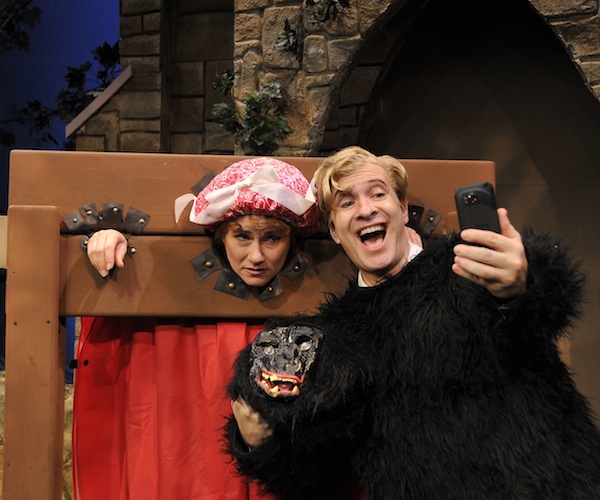Fuse Theater Review: “Intimate Exchanges” — A Comedy of Possibilities
In many ways, Alan Ayckbourn in Intimate Exchanges has concocted the perfect recipe for a company like the Peterborough Players.
Intimate Exchanges by Alan Ayckbourn. Directed by Gus Kaikkonen. Staged by the Peterborough Players, Peterborough, New Hampshire, through July 12.

Beverly Ward and Kraig Swartz in the Peterborough Players production of “Intimate Exchanges.” Photo: Deb Porter-Hayes
By Jim Kates
Tragedy trades on inevitability. The currency of comedy is contingency — if this, then that, maybe. With Intimate Exchanges, English playwright Alan Ayckbourn carries this notion of possibility to a logical extreme. His script supplies sixteen alternate endings, with the actors themselves choosing each evening’s conclusion. The expanse of this theatrical gimmick poses a considerable obstacle for a small repertory company with a two-week run to sustain, so the Peterborough Players have stripped down the potential climaxes to two. And then they’ve added the fillip of audience participation; each show’s last scene is decided by a ballot vote during intermission. Given the choice made on opening night, it was easy to guess how the alternative wind-up would have played out, and might on any other night of the run.
Leading up to that choice, Intimate Exchanges gives us the story of ‘Educating Sylvie’ (Beverly Ward) who starts out as domestic help in the household of a school headmaster much too fond of the bottle, Toby Teasdale (Kraig Swartz) and his very correct wife Celia (Beverly Ward). She is courted in a manner of speaking by an employee of the school, Lionel (Kraig Swartz) called in by Celia to help straighten out their back yard. At first, Lionel seems to be making a play for the good wife amid the greenery, but we are quickly introduced to Sylvie and what becomes a less-than Lawrencian relationship with the gardener. Lionel is abetted in his wooing by his own father Joe (Kraig Swartz) a prematurely aging moralistic poetaster who seems to have been wheeled into this play from a lost manuscript by Kaufman and Hart.
The alternatives present themselves: Will Sylvie choose life with Lionel; or, sparked by the tutelage of Toby, strike out in an unexpectedly different direction? The voting is based on two enigmatic title choices, “The Return of the Prodigal” or “The Christening.”
Director Gus Kaikkonen has placed an enormous amount of trust in the theater’s audiences. Not only do they vote for the conclusion, but he is content to let the comedy of Intimate Exchanges move at its own slightly understated English pacing, allowing the momentum to build. The laughter in the house builds accordingly, slowly at first and then with increasing assurance and delight.
When she is Celia Teasdale, Ward has her best comic moments in the opening scene, bouncing off the innuendoes of Lionel as he seems prepared to cultivate her garden. Before the end of that scene, however, she has been happily upstaged by Ward’s Sylvie, whose rambunctious body supplies all the laughter that Ward’s Celia generates in her restraint. The two women play so effectively against each other that we would easily forget, if it weren’t so much fun to remember, that they are one actress.
The two Ward characterizations are matched and then one-upped by the three faces of Kraig Swartz. Ironically, those roles do not rely on the kind of manic energy that animates Ward’s clowning. Swartz seems to be settling into a more mature, quieter mode, most effectively in the balance attained by Toby Teasdale, which leads us to believe that — alcoholic as the headmaster might be — he remains a functional drinker. Even Lionel, the most active of his three characters, moves around in a fairly deliberate way, a control that clues us into the limitations of a figure who wants us to think he’s grander than he is. And finally, confined to Joe’s wheelchair, Swartz has little to work with but his voice, which takes on spunk denied to the stymied body.
Charlie Morgan has designed a set that works as flexibly as the script.
In many ways, Ayckbourn in Intimate Exchanges has concocted the perfect recipe for a company like the Peterborough Players. It engages without weighing heavily. If it’s a tad old fashioned in some of its attitudes, especially towards feminism, this dating is quickly recognized and easily assimilated. The play give the actors an opportunity to show off their versatility and the director and production staff their ingenuity.
And you can see it twice.
Jim Kates is a poet, feature journalist and reviewer, literary translator and the president and co-director of Zephyr Press, a non-profit press that focuses on contemporary works in translation from Russia, Eastern Europe and Asia. His translation of Mikhail Yeryomin: Selected Poems 1957-2009 (White Pine Press) is the winner of the second Cliff Becker Prize in Translation.
